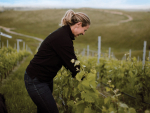Getting Dinner Done
Australia-based French chef Manu Feildel has teamed up with Ingham’s NZ to launch the poultry producer’s Dinner Done campaign.
Advance planning to select a strong and distinctive brand can avoid unnecessary expense later on. This article provides tips on steps you can take to minimise risk when choosing a new brand.
What is a “strong” brand?
Branding is all about distinguishing yourself from the competition. You should avoid selecting a trade mark which is:
• identical or very similar to someone else’s brand; or
• an industry term which others are likely to want to use.
• Avoiding conflict with other winemakers
The key to avoiding infringement of another winemaker’s rights is the three “Rs” – Research, Research and Research.
You should research thoroughly to ensure that you are not about to commit to a trade mark which is already used or registered by someone else. Once a trade mark has been used it will have acquired a reputation. If you launch a trade mark which is identical or similar to one with an established reputation, or one which has been registered, you are immediately at risk. Aside from the embarrassment, the worst case scenario is that you could have:
• infringed a registered trade mark, in breach of the Trade Marks Act;
• been misleading or deceptive, in breach of the Fair Trading Act; and/or “passed off” your wine as that of another winemaker.
You may be forced to recall stock and pay damages. There would also be the expense, delay and inconvenience of re-branding and re-labelling.
Marketplace searching
New Zealand’s wine industry is comparatively small. You probably have a fair idea already about the trade marks which are on the market.
However, you should harness the power of the Google.com search engine to see if your desired trade mark is being used by others. You should also search other directories for clues that someone else has already made a claim to the proposed brand. As well as online business registers, we recommend searching industry and retail websites.
Trade Marks Register searching
Rights are also established by registering a trade mark. A registered trade mark does not necessarily have to be in use. If you only conduct marketplace research, you could miss a trade mark which has been registered and not yet launched, or which is no longer used but is still registered.
A trade mark registration gives rights not only in the exact mark but also prevents use of a confusingly or deceptively similar mark. This means that searching the Register is not straightforward. It is not enough simply to look for the exact trade mark which you have in mind. We recommend getting expert help from a trade mark lawyer.
Overseas searching
Most winemakers will look to export as well as sell domestically. Your research should cover all countries to which you plan to export. In a later article in this series we will discuss how to plan for overseas expansion.
Selecting a trade mark which others should not need
A trade mark lawyer will tell you that invented words make the best trade marks. XEROX and KODAK are classic examples of made up words which are completely distinctive. No-one else could claim to need to use these words in relation to their own products.
Marketers will tell you that the best brands are ones which tell consumers about the product. McCain Foods’ HEALTHY CHOICE is an example of a popular brand which tells you about the product, but which has been heavily litigated because others wanted to use the same phrase.
The compromise – which is very effective when well executed – is to select a trade mark which is suggestive of the characteristics of the product, without being a direct description. MAKE IT POP is an example of a suggestive trade mark for sparkling wine.
Geographic locations
It is common in the wine industry to select a geographic name as a trade mark. This works well if you are the only winemaker in that location. If the name is a region (e.g. Marlborough) then it will be difficult to register the trade mark and to claim exclusive rights. You will not be able to stop others from that area using the same name.
Personal names
It is also common to use your own name as a trade mark. This works well if you use your full name (e.g. Timothy Smith) and if there is no-one else in the industry of the same name. Using a first name or surname only can be problematic. The surname SMITH is quite common and others with the same surname may have a legitimate need to use the name for their own wines.
Checklist
To summarise, here is a checklist of points to consider when selecting a new brand:
• Create a shortlist and try not to become too emotionally attached to any potential trade mark – you might have to go with another one!
• Check out your competitors’ current brands
• Search industry directories
• Search Trade Marks Register
• Avoid trade marks which describe the characteristics of the product
• Only use a geographic location if the location is unique to your vineyard
• Use full names, rather than first names or surnames only

OPINION: Harvest begins, and almost immediately we start to get media enquiries about how the vintage is going and whether it…

OPINION: Rachael Cook is the smiling grape grower on this month’s cover, tending vines on the miniscule, beautiful and dream-driven vineyard…
New Zealand wine enthusiasts have a deepening understanding and growing appreciation of sparkling wine, says Mel Skinner, Chair of Méthode Marlborough…
One of the biggest mistakes wine marketers make is in assuming consumers are as passionate and knowledgeable about wine as…
Taking two sustainability awards at two events on a single evening felt like "true recognition" of the work Lawson's Dry…